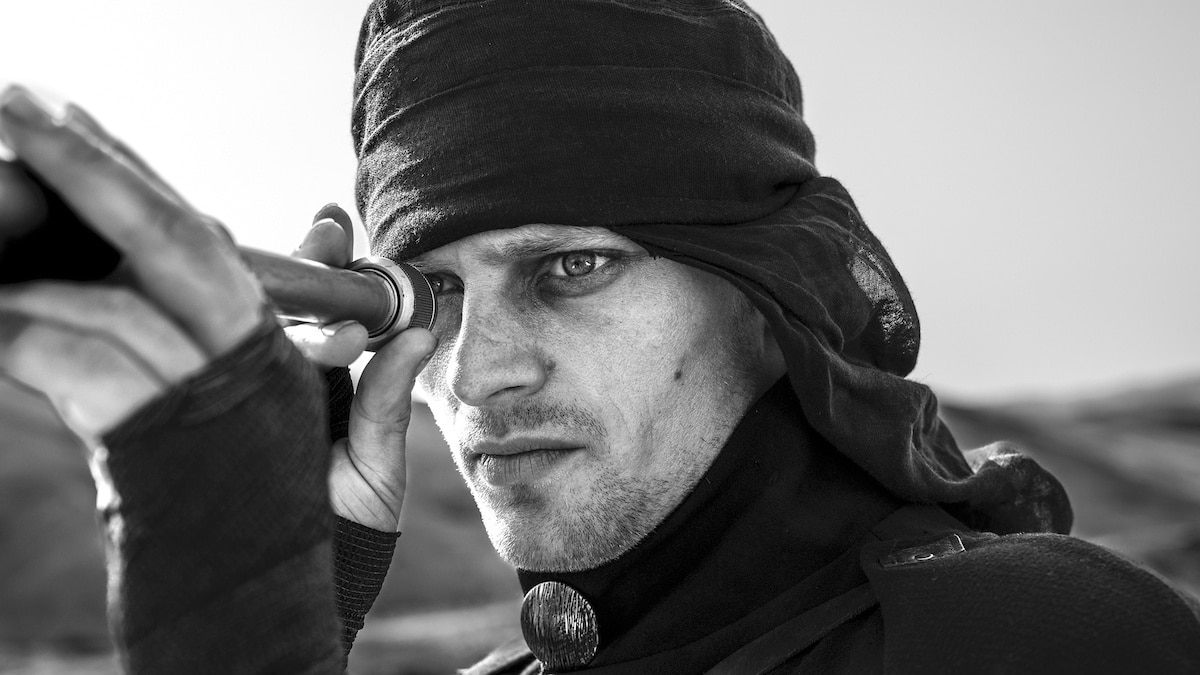




Dir/Wri: Jessica Woodworth | Cast: Jonas Smulders, Geraldine Chaplin, Jan Bijvoet, Sam Louwyck | Drama, 94′
Luka is a dystopian desert phantasy, re-creating a Spartan military state ruled by fear and paranoia, sometime in the distant past. This striking first single outing for Belgium/American director-writer Jessica Woodworth (King of the Belgians) is based on the novel ‘Il deserti dei Tartari’ by Dino Buzzati. The focus is a talented young sniper desperate to see active service in the defence of his country in an impending invasion, the threat of which drives our anticipation forward.
Gripping in the early stages, not least for its visual allure, the film is unable to sustain this momentum for the entire running time. But the highlight is DoP Virginie Surdej’s symmetrical, architectural compositions and her sepia-tinted black & white images which make Luka a memorable and captivating interpretation of the classic novel.
Jonas Smulders is an appealingly boyish hero as Luka the young marksman who, after wishing his mother a fond valedictory in the film’s opening scenes, strides across Steppe-like open terrain to serve as sniper in the Kairos Fort, in the desert of the “North”. There’s something of David McCallum’s ‘Illya Kuryakin’ in Smulders’ feral enfin-like features, making him rather an androgynous romantic hero. But his impatience for battle gives him a steely resolve that tempers this puppyish charm: clearly he is keen to get cracking on the battlefield.
In this testosterone-charged atmosphere the sniper soon becomes close to Konstantin (Tadevossian), who is a listener, trying to detect – with his rather basic electronic equipment – any attack by ‘the North’. But Luka increasingly warms to Geronimo (Schrevens), the son of one of the military leaders. And when Konstantin detects a possible attack from ‘the North’, Luka’s superior sniping skills see him being chosen by the General and Raf (Bljvoet), the most fanatical of the leaders, to go out into the desert and destroy the enemy.
Luka has the right to select a companion, and he goes for Geronimo. The men walk into the desert where they catch sight of a horse. On their return to the fort, where Raf questions their findings. Konstantin is accused of deliberately misinterpreting his data, and Geronimo for imagining the horse. Geronimo and his father escape into the desert, while Luka is sentenced to ghosting, a sadistic punishment involving death by water deprivation and solitary confinement. Luckily, a new alarm saves his life and soon he is out in the desert again chasing phantoms, at least for a time.
Buzzati’s writing is close to Stanislaw Lem, and there are echoes of Tarkowsky’s Stalker, but the difference here is that Buzzati paints the picture of a semi-fascist military state, with the protagonists’ distinct idiosyncrasies. In this way, a narrative can develop, making the circumstances secondary – very much the opposite of Tarkovsky’s approach of a sprawling narrative with the destructive action becoming the primary point of the feature.
Geraldine Chaplin gives an enticing performance as the General, and Smulders offers intrigue as the naïve pawn in a deadly game. The film could benefit from a tighter middle-section to make it more punchy in its appeal as a dramatic narrative and an essay on power structure relying on a mirage-like enemy. AS
BIG SCREEN AWARDS | ROTTERDAM INTERNATIONAL FILM FESTIVAL 2023